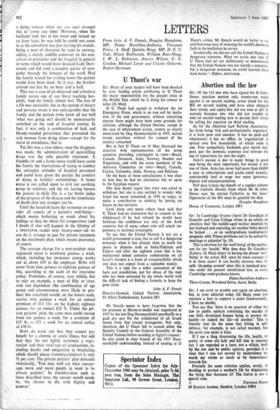U Thant's war
LETTERS
From John A. F. Ennals, Douglas Houghton, MP, Diana Hamilton-Andrews, Trevenen Peters, A. Shell Quintin Hogg, MP, D. E. C. Yale, Hilary Rubinstein, William Rees-Mogg, 1. W. L. Robinson, Antony Wilson, G. E. Gordon, Michael Levey and Charles Osborne, Robert Hartman.
Sir: Many of your readers will have been shocked by your leading article attributing to U Thant the major responsibility for. the present crisis in the Middle East which he is doing his utmost to solve (26 May).
If U Thant had agreed to withdraw the UN Emergency Force, which is on UAR soil by invita- tion of the UAR government, without consulting anyone there might have been some grounds for criticism, although the United Nations, except in the case of enforcement action, cannot, as clearly enunciated by Dag Hammarskjold in 1957, station troops anywhere without the consent of the country concerned.
But in fact U Thant on 18 May discussed the situation with representatives of the seven countries providing contingents to tniEF—Brazil, Canada, Denmark, India, Norway, Sweden and Yugoslavia, and with the seven members of the Advisory Committee on UNEF—Brazil, Canada, Ceylon, Colombia, India, Norway and Pakistan.
On the basis of these consultations it was clear to him that he had no alternative but to agree to the Egyptian request.
One may deeply regret that UNEF was asked to withdraw, but one is also entitled to wonder why Israel has never consented, in 1956 or today, to make a contribution to stability by having mg forces on her territory.
Lord Avon and many others have said that U Thant had no alternative but to consent to the withdrawal—if he had refused he would have forfeited the confidence not only of the Arab countries but of many others who still attach im- portance to national sovereignty.
To say that the United Nations is not yet a world government is true, but to call it a dangerous nonsense when it has already done so much for peace in disputes such as India/Pakistan and Cyprus and after the eighteen years that it has maintained mixed armistice commissions on all Israel's borders is a form of irresponsibility which one does not expect from a reputable weekly.
This is a time for a sober assessment of the facts and possibilities, not for abuse of the man who has been entrusted by the whole world with the difficult task of finding a formula to keep the guns silent.
John A. F. Ennals Director-General, United Nations Association, 93 Albert Embankment, London SE1 Mr Ennals seems to have forgotten that the UN presence at Sharm-el-sheikh was negotiated in 1957 by the late Dag Hammarskjold specifically as a quid pro quo for the withdrawal of all Israeli forces from that crucial strongpoint. Not only, therefore, did U Thant fail to consult either the Security Council or the General Assembly of the United Nations before acceding to Egypt's request: he also acted in clear breach of the 1957 Ham- marskjold understanding. Instead of carping at U
Spectator Index
Copies of the Spectator Index for July- December 1966 may be obtained, price 7s 64 post free, from the Sales Manager, The Spectator Ltd, 99 Gower Street, London, WC I .
Thant's critics, Mr Ennals would do better to try and find some way of restoring the world's shattered faith in the institution he serves.
Incidentally, we did not call the United Nations a dangerous nonsense. What we wrote was that 'if U Thant had set out deliberately to demonstrate that the United Nations was not merely a nonsense, but a dangerous nonsense, he could scarcely have done better.'—Editor, SPECTATOR.


































 Previous page
Previous page